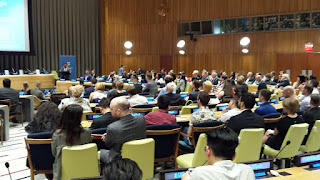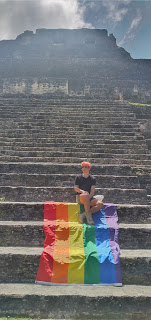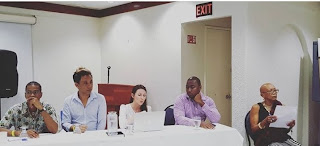Art Exhibition, Belizean LGBT Advocacy and Social Statements
18th December, 2013
We rarely think of art as a powerful expression of the time, but with the coordination effort of the Mexican Cultural Institute, I have come see art an emotional expression of the times that may reflect corruption, violence, gender inequality, social disparity and division. The work of this Mexican illustrator Jose Guadaloupe Posada makes the point very clear that art can mirror social reality. While the art is intended to be satirical about difficult social issue, it makes the point that in Belize, like else where, we have social inequity and that ignoring it like this man did on the left, is not going making social problems go away.

Last night I was invited to an exhibition called the "Alignment" done by Nelson Young, a Belizean. He spoke of his exhibition representing the pass and present, he spoke of people moving away from the bible and forgetting the basics of right and wrong.

We rarely think of art as a powerful expression of the time, but with the coordination effort of the Mexican Cultural Institute, I have come see art an emotional expression of the times that may reflect corruption, violence, gender inequality, social disparity and division. The work of this Mexican illustrator Jose Guadaloupe Posada makes the point very clear that art can mirror social reality. While the art is intended to be satirical about difficult social issue, it makes the point that in Belize, like else where, we have social inequity and that ignoring it like this man did on the left, is not going making social problems go away.

Last night I was invited to an exhibition called the "Alignment" done by Nelson Young, a Belizean. He spoke of his exhibition representing the pass and present, he spoke of people moving away from the bible and forgetting the basics of right and wrong.

When one looks at the exhibition as an observer, labels such as "liviticus" and "Apocalypse" trigger raw reactions as these paintings solidify labels and a history of intensified institutional prejudice that has cause both psychological and physical harm to me and my community. The UniBAM effigy comes to mind where church leaders denied the symbol of hanging was infront of their so called constitutional march done in the Toledo district, in July 2013. Additionally, getting hate mail on facebook like this does not help to solidify personal security issues. Nelson Young art exhibition, maybe abstract, but its message of remembering the basics of right and wrong reverberates in anyone, whose social consciousness believes in social justice for all.
An opportunity, arose, with just such a person in private conversations. In that conversation about daily lives, I was reminded that the violation of individual dignity has a medical cost, but the psychological harm is cumulative when symbols of the state choose to inflict unnecessary harm to a citizen in the course of an arrest. In this case, the hair of a dreadlocks was cut in the process of a rub down for evidence of marijuana. Ultimately, the conversations turned into a need to strengthen current human rights systems that would allow penalisation and investigation of cases of abuse or discrimination; the need for child advocates to represent children more effectively in cases of horrible sexual and physical violence among other issues.
What gives me hope in the art exhibition of both Jose Posada and Nelson Young is that both recognise the need for quality of life to be improved and that there is a vision of "better must come" For Nelson Young, his paintings speaks of being enlightened using parables and having a vision that addresses social inequity with compassion.
Christians often speak of compassion, opponents like Belize Action, however, who do not support advancing the dignity and right of L.G.B.T citizens in any concrete way have sought to stir up mud in the public mind, in a way that deviates from the long held culture that has been inclusive, supportive and tolerant. Even the Constitution of Belize , expresses a basic principle of inclusiveness because it gives the option for redress to all citizens if they feel that they experienced a level of discrimination. The piece below highlights the hope that future dialogue will be about function, pragmatism and about upholding the dignity and worth of not only L.G.B.T persons, but all citizens in a systematic way. Until then, the work of Posada and Young will continue to deliver the message that basic colors may express diversity and spaces of division, but it does not mean that humanity need remain divided by ideology, despite its diversity. Ultimately, what unites us is our desire for peace, family and quality of life. Respect for diversity and upholding the ideals that dignity and rights matters doesn't change individual beliefs, it serves only to improve our humanity.










Comments
Post a Comment